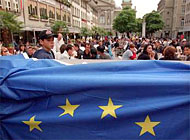National day leads to fresh search for Swiss identity

As Switzerland celebrates its national day on August 1, the question of Swiss identity and how the Swiss view themselves in the world, is dominating public debate.
On the 809th anniversary of the founding of the Swiss Confederation, the debate about Swiss identity is raging as vigorously as ever. The central question is how a place with four national languages and a population of only seven million – 20 per cent of whom are foreigners – can consider itself a “country” in the generally understood sense of the word.
For people like Stefan Kux, a senior lecturer in international affairs at the University of Zurich, Swiss identity is simply a myth. “A Swiss nation doesn’t exist. Switzerland is a concept: a model of social life, of political culture, of peaceful coexistence.”
Foreigners living here seem to take a similar view. Christiana Oelrich, bureau chief in Switzerland for the German press agency, DPA, feels that Swiss identity is a local preoccupation, which means nothing to people abroad.
“Every canton and community has their own identity – I’m not sure they would say we have a Swiss identity. On the international level, Switzerland stands for excellence, expertise – there’s no problem with the image of Swiss identity on an international level.”
Switzerland’s image abroad may be strong, but its relations with the rest of the world are anything but clear-cut. The country is not a member of the UN, yet it sends peacekeepers on UN missions and is home to the UN’s headquarters.
Switzerland’s relations with the European Union are also ambiguous. It has shied away from joining the EU, yet behaves much like a member state, having recently approved a series of accords with the EU from agreements on transport to the free movement of people. It also closely follows the European Central Bank on interest rates and other economic issues.
Stefan Kux explains Switzerland’s rather schizophrenic attitude to Europe and the UN in terms of its uniqueness. “It’s just the Swiss following their own path. We do it our way, and we are essentially behaving like a small state – we have a success story and we don’t want to jeopardise that.”
Christiana Oelrich understands Swiss anxiety about opening up to the rest of the world but believes that time is running out. “Why do the Swiss continue to stand aside? This makes people suspicious: they ask why Switzerland chooses to stay out of the international community.
“There’s a danger that they may suspect Switzerland is staying apart because it benefits them at the expense of others. The country’s wartime past is a case in point.”
Kux is less concerned. He says “it’s just a question of time” before Switzerland joins the EU and the UN. “We have a consensus system, we have a difficult voting system – Switzerland is more democratic than many countries, so these things take more time.”
Kux feels the government and the populace are out of step over issues such as EU membership and that the government needs to work harder to change people’s attitudes.
“There is a gap between the government and the population. But this is not insurmountable. We are opening up – for instance on the free movement of labour – and there are some anxieties. But there are also good reasons to open up. This message needs to be put across.”
There is evidence that this is happening slowly, but the latest survey of Swiss attitudes, published over the weekend in the leading German language Tages-Anzeiger newspaper, suggests that much work remains to be done.
Of the 1,000 people who took part in the survey, more than half pronounced themselves “very content” with life in Switzerland. In fact, just one per cent complained that they were “totally dissatisfied”. The second largest group – 35 per cent – were “more or less happy”.
However, the reasons for this overwhelming cheerfulness apparently have more to do with things like family and friends, rather the country’s strong economic performance or the government.
Indeed, aside from concerns about environmental issues, crime, drugs and Aids, the Swiss were most concerned about the damaging effects of big business. Slightly more than half believe that top managers run companies solely for profit, and don’t care what effect their activities have on Switzerland.
The government received a similarly damning verdict, with 40 percent of respondents saying politicians and public officials were “probably” or “definitely corrupt”, and just 12 per cent saying they felt politicians really represented their interests.
As the country prepares to celebrate national day, Kux is optimistic about the future, and believes the Swiss are, too. “Switzerland consists of many identities, but the bottom line is that it is a success story. The lifestyle here is cherished. The national holiday, on August 1, is just to say, ‘hey, it’s okay to be Swiss’.”
by Jonas Hughes

In compliance with the JTI standards
More: SWI swissinfo.ch certified by the Journalism Trust Initiative
You can find an overview of ongoing debates with our journalists here. Please join us!
If you want to start a conversation about a topic raised in this article or want to report factual errors, email us at english@swissinfo.ch.